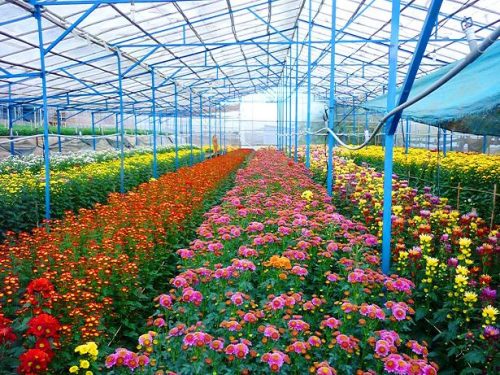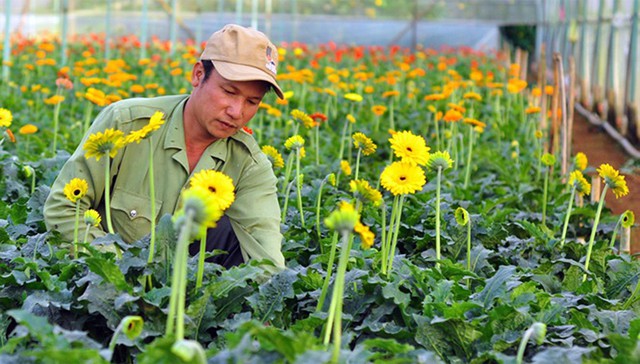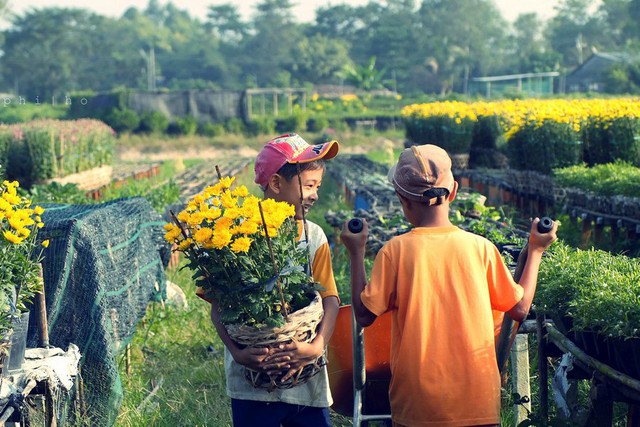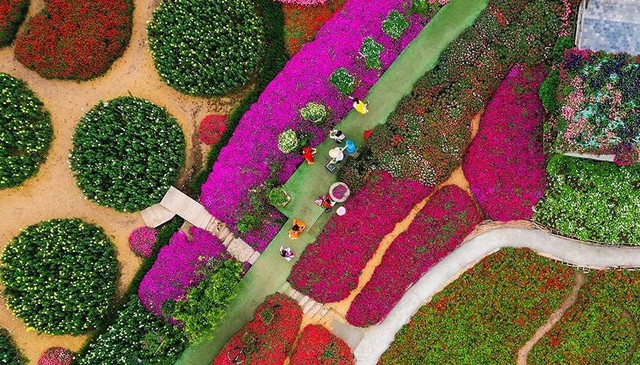Ha Noi boosts hi-tech flower farming for sustainable growth
VGP - Ha Noi is ramping up efforts to develop hi-tech flower cultivation by expanding greenhouse and net house production areas, introducing new varieties and modern techniques, and converting low-yield rice fields into flower-growing zones.

These initiatives aim to build a green, climate-resilient agricultural sector integrated with eco-tourism.
Thriving hi-tech models
According to the Ha Noi Agricultural Extension Centre under the Municipal Department of Agriculture and Environment, the capital currently has more than 3,000 hectares of flower-growing areas, including about 47 large-scale zones covering over 1,800 hectares in districts such as Tay Ho, Me Linh, Dan Phuong, Thuong Tin, and Gia Lam.
High-quality flower cultivation makes up over 30 percent of this area, with popular varieties like orchids, lilies, and chrysanthemums already being exported.
Many hi-tech flower farms have adopted automated irrigation, light, and temperature control systems, achieving impressive productivity. The average production value ranges from VND 500 million (US$18,900) to VND 1.5 billion (US$56,900) per hectare annually, with some models generating up to VND 2.2 billion per hectare.
The application of smart management systems, greenhouse and net house technologies, and water-saving irrigation helps farmers proactively manage production, meet strict market requirements, and increase profitability compared with traditional cultivation methods.
Ngo Minh Truong from My Hung Commune shared that his family has been operating a 2,500-square-meter orchid garden using hi-tech methods since 2019. The farm now grows nearly 80,000 orchid pots across 30–40 colorful varieties. "Hi-tech flower cultivation not only delivers higher economic efficiency but also produces diverse, stable, and high-quality products. It enhances competitiveness both at home and abroad while reducing chemical use and optimizing resources, contributing to environmental protection and public health," Truong said.

Linking flower farming with tourism
Despite encouraging outcomes, the sector still faces challenges, including high investment costs, production risks, small-scale operations, and limited branding among cooperatives and businesses, which hinder market expansion.
To scale up hi-tech flower farming suited to Ha Noi's soil and climate, Nguyen Thi Thuy, owner of Me Linh F-Farm, suggested that the city continue offering preferential credit policies to support investment in infrastructure, greenhouses, and modern facilities. She also called for stronger technology transfer and assistance in developing local flower brands to enhance market access.
Nguyen Manh Phuong, Deputy Director of the Ha Noi Department of Agriculture and Environment, said the department will strengthen cooperation with localities to provide training on greenhouse flower cultivation techniques to improve productivity and efficiency. It will also guide farmers in disaster prevention and climate change adaptation while gradually converting low-yield rice fields—particularly along riverbanks—into flower cultivation zones combined with experiential tourism.

Nghi Tam flower village – the long-standing flower village
The department plans to work with relevant units under the Ministry of Agriculture and Environment to research and develop new flower varieties suited to local conditions and consumer demand. Local authorities and industry associations will also cooperate to build brands, establish planting codes, and create digital maps for ornamental plants.
These concerted efforts are expected to boost product value per unit of land, create jobs, raise farmers' incomes, promote exports, and support agricultural restructuring—while beautifying Ha Noi's landscape and protecting the environment.

Notably, Ha Noi issued a Plan for the Development of Hi-Tech Agriculture in the City through 2030. The plan aims to promote the effective application of advanced, digital, and smart technologies in agriculture, contributing to the building of a comprehensive, ecological, and modern agricultural sector characterized by concentrated commodity production, high value, and sustainability. It also seeks to improve product quality and food safety while supporting the successful restructuring of the agricultural sector toward higher value and sustainable growth.
By 2030, at least 20 percent of scientific and technological tasks related to the application of hi-tech and digital technologies in agriculture are expected to be researched, applied, and transferred to serve the city's agricultural development.
The development of hi-tech flower farming is not only a solution to adapt to climate change but also reflects a strategic direction in modernizing the agricultural structure. These models are helping to produce diverse, high-quality flowers, raise farmers' incomes, and build the Ha Noi flower brand in the domestic and international markets.
More importantly, the application of science and technology promotes sustainable production, resource efficiency, and emission reduction, thereby laying a solid foundation for the capital to advance toward a green, safe, and climate-resilient agricultural sector.

